Far Horizon Read online
Page 2
‘No, Carlos, don’t worry about it,’ Mike said. ‘We’ll see it through.’ Mike knew this was an easy statement for him to make, as he only had a month left to run in Mozambique of his posting with the UN Accelerated De-mining Program. After that, he would be off home to Australia. Or maybe even to Portugal with Isabella, if things worked out.
‘Right, let’s get to work,’ Mike said.
Carlos nodded and drained his cup. They loaded the jerry cans and climbed into the Nissan for the short, bumpy trip from their bush campsite along a track one of the UN teams had been clearing of antipersonnel mines. The team had been called away two days earlier to destroy some mortar bombs found in a small village north of Mapai. They should have been back by now, but it had turned out the bombs were just the first items in a big cache of ammo left over from the civil war days, and they had been delayed.
Carlos and Mike had been warned that a party of politicians and journalists were going to be visiting their AO – area of operations – in a week’s time. They had been tasked by Jake, their supervisor, to find some accessible places where they could safely show the VIPs what the UN teams were doing.
‘All this for a PR stunt, eh? What a joke,’ Mike said as he drove. Carlos stayed silent. Despite his complaining, Mike knew that glad-handing politicians and babysitting journalists was an important, if sometimes painful, part of their job. The recent pace of international events had taken the world’s attention away from UN backwaters like Mozambique and the de-miners knew they were fighting for every cent of funding from a shrinking budget. The more publicity they could generate about their work, the greater chance they had of staying in business until the job of mine clearing was finished once and for all.
Carlos’s silence unnerved Mike. Normally the African was chatty, and ordinarily Mike would have been grateful for the respite. He hated mornings. Today, though, he craved his friend’s banal questions about life in Australia and the other countries he had visited, or his musings on the league table of African soccer teams, which interested the Australian about as much as the game itself. Mike busied himself by turning on the Global Positioning System receiver mounted on the dashboard and watching the clever little gadget acquire a signal from three orbiting American satellites somewhere in space.
It was seven o’clock when they arrived at the track junction, where the mine-clearing team had stopped work before being called away. Carlos and Mike had arrived in the area the previous evening, but it had been too dark to carry out their inspection. They had camped overnight in the bush nearby.
Mike stopped the truck and pulled out the large-scale map of Mozambique from between the driver’s seat and the console, and then pushed the mark button on the GPS. This gave him a readout of their position on the earth’s surface, in latitude and longitude. He wrote down the coordinates in his green hard-covered army-issue notebook.
‘Twenty-three degrees, twenty-seven minutes south, and thirty-one degrees, fifty-five minutes east. We’re slap-bang on the Tropic of Capricorn,’ he said, pointing at the first row of numbers on the screen. Carlos smiled politely, but said nothing.
There were no recognisable features in the dense mopani forest, but somewhere a few kilometres to the west of them was the border with South Africa and, on the other side, the world-famous Kruger National Park. About a hundred kilometres to their north, and slightly west, the borders of South Africa, Zimbabwe and Mozambique all converged. On the South African side, opposite where they were plotting the minefield, was one of the highest densities of wildlife in the world, but in Mozambique, the bush was all but devoid of large mammals.
They stayed seated in the Nissan, the engine ticking over in order to keep the air-conditioner running.
‘Bloody shame to think about all those rhinos and elephants and everything else that used to be here,’ Mike said, as he surveyed the bush around them.
‘People starved during the civil war – and after it. They had to eat,’ Carlos replied, not meeting Mike’s eyes as he spoke.
Mike knew that the local people had snared and shot game to feed themselves, but others had turned to the poaching of bigger game, such as rhino and elephant, out of greed. He said nothing, though.
The only sign of wildlife Mike had encountered in Mozambique, apart from snakes and baboons, was the eerie whoop of the hyena, which could occasionally be heard in the bush at night. Recently, however, he had read that the fence on the South African border had come down and there was now nothing stopping all manner of dangerous creatures from wandering into areas like the one they were visiting, where their teams had been clearing mines.
Mike checked the map again. The area where they were working, an old hunting concession named Coutada 16 by the Portuguese, was to become part of a peace park or, to use the technical name, a trans-frontier conservation area. The peace park concept, he thought, was a good one. It envisaged cross-border national parks where animals could migrate freely and safely across Africa’s international borders, and well-heeled tourists could pour millions of dollars into bankrupt economies. One of the envisioned ‘super parks’ would unite the Kruger park with Coutada 16, along with Gonarezhou National Park in Zimbabwe to the north. A great idea, but there were many obstacles to overcome before it would ever become a reality. Like landmines, for instance.
‘Someone’s taking this peace park thing seriously, otherwise why would we be clearing bush in the middle of nowhere?’ he asked rhetorically.
‘At times I never thought I would live to see peace in my country,’ Carlos said as he wound down the window and lit a cigarette. ‘You think it is sad about the animals, and it is, but think how cruel man is to man as well. Look at the landmines and the bombs we uncover. From all over Africa, from all over the world. First the Rhodesians chasing the Zimbabwean nationalists around our country – mining, bombing, shelling. Then the South Africans and RENAMO fighting us in FRELIMO. Landmines and bombs from Russia, Germany, Czechoslovakia, England, Portugal, South Africa . . .’
Mike said nothing, just nodded. He sensed the sad realisation that was sweeping over his friend, the bitter irony that he had survived so many years of war only to be struck down by an avoidable disease. Though still poor, Mozambique’s fortunes had grown year by year since the end of the civil war between Resistencia Nacional Mocambicana, the Mozambique National Resistance, or RENAMO, and the Frente de Libertacao de Mocambique, the Front for the Liberation of Mozambique, known as FRELIMO. Former fighters from both sides had been working together to rebuild the country since the first multiparty elections in 1994, and while Carlos had lived to see his country at peace, he would not see it prosper.
When Carlos had finished his cigarette, Mike said, ‘Remember, we’re just here for a recce, OK? I want to make sure it’s going to be safe enough to bring the politicians and the media this far into the bush.’
‘I think you are impatient for your doctor’s appointment, yes?’ Carlos said with a wink.
Mike was pleased to see Carlos’s spirits lifting, even if his levity was laboured.
Their local guide, an elderly Mozambican called Fernando, came into view, walking around a bend in the track. The de-mining team working in the area had praised his knowledge, eyesight and good humour.
Carlos got out of the Nissan first and spoke to Fernando for a while in Portuguese, the common national language of their former colonial masters. He translated the gist of their conversation for Mike. ‘He was a park ranger before the war, working for the Portuguese. Then he worked as a hunting guide in Coutada 16 and now we pay him.’
Mike guessed his age at somewhere between fifty and seventy. Fernando had a cap of tight frizzy grey curls atop a face as weathered and lined as elephant hide. He had two teeth left in his top row and none in his lower jaw that Mike could make out. He was dressed in the tattered remnants of his old khaki National Parks uniform. His shirt was patched in several places and his shorts were frayed and held up with a knotted length of twine, but creases showed where both ha
d been neatly ironed.
Fernando straightened his wizened body and saluted Mike as he stepped down from the Nissan. Mike noticed that the AK-47 at his side was obviously cared for by him as lovingly as his tattered uniform was by his wife. The rifle was probably as old as his clothes, but, like them, still did the job.
‘Bom dia, Major,’ he said. Mike returned his salute and the greeting.
Carlos and Mike left the Nissan and followed Fernando along the course of white plastic tape the clearance team had strung out to trace the cleared section of the minefield. Mike recalled from the team’s initial report that the mines they had so far found were antipersonnel, Russian-designed and made in Poland in the 1970s. Nasty little bastards designed to take off a foot or shatter a leg below the knee.
Mike looked up and down the track and stroked his jaw thoughtfully. He wondered if he could usher twenty or thirty civilians, including pushy photographers and television cameramen, along the narrow path without any of them stumbling over the white tape.
‘Mike, over here,’ Carlos said. He was down on one knee, at the extreme end of the cleared path next to one of the metal stakes that supported the white tape marking the corridor. He had a twig in his hand and was gently scraping the dirt in front of him.
‘What is it?’ Mike asked.
‘PMN 2.’
Carlos got down on both knees now, lowered his head and gently blew the dust away. The smooth round pressure plate of the antipersonnel mine was gradually revealed.
‘Nasty,’ Mike said. ‘Whichever of our guys drove the last stake into the ground didn’t know how lucky he was.’ The rusted metal picket was only centimetres from the mine.
‘I’m going to lift it,’ Carlos said, looking into Mike’s eyes.
‘No. Mark it and let’s move on.’
Carlos held Mike’s stare and shook his head. ‘We can’t leave it here, Michael. You know that. It is a hazard to our men, let alone the dignitaries.’
‘Carlos, we’re desk jockeys, for Christ’s sake.’ Both Mike and Carlos were trained de-miners, but their task as senior members of the UN mission was the planning of operations, not digging in the dirt. Mike’s unvoiced concern was Carlos’s emotional state in the wake of the news he’d just received. On the other hand, he wanted to convince Carlos that he still had a future with the UN team, despite his illness.
‘All right,’ Mike said, ‘but at least let me get your protective gear.’
*
Mike checked the heavy diver’s watch on his wrist. It was already nine. ‘How’s it going?’ he called across to Carlos. Again, he felt guilty that he’d been lost in thoughts of Isabella – her perfume, her dark eyes, her slender legs beneath a short denim skirt – as he sat on the fallen log, smoking, while Carlos worked.
Carlos had found a second mine near the first and insisted that he should disarm that one as well. It was still in the ground in front of him, but he had cleared the soil from the pressure plate.
‘Almost finished, but I am getting too old for this business, I think.’ Carlos straightened his back, rose up on his knees and undid the Velcro fastenings of his armoured vest to let the air through to his chest. He raised the clear protective visor of his blue helmet and wiped the sweat from his face.
As Mike started to rise he heard a soft tap tap behind him, and froze.
He looked back over his shoulder and saw that Fernando had stopped dead-still in the centre of the cleared track. He was tapping the tin magazine of his AK-47 with a finger to get their attention. The barrel of Fernando’s rifle was now pointed towards the bush to Mike’s left. The old man was sniffing the air, his broad nose wrinkling in distaste.
Carlos and Mike did the same. Mike smelled its pungent, musky, dirty-washing odour, then heard the telltale crack of splitting wood as it ripped a branch from a tree.
‘Elefante,’ Fernando whispered.
Fernando began to move forward, but Mike placed a firm hand on his iron-muscled calf as he drew alongside him. Mike pointed across to the ground in front of Carlos, indicating the mine the other man had just unearthed. Fernando nodded and stood his ground.
They could all hear the beast clearly now, snapping off branches from a tree somewhere in the bush, maybe forty or fifty metres away. Mike held his breath and craned his neck for a glimpse. It sounded to him like there was only one.
The local newspapers and television news had carried a story the week before about how the South African National Parks Board was relocating elephants across the border from Kruger, to build up the numbers of big game on the Mozambique side of the peace park. But the relocation, according to the media, was happening a fair way north of where the de-miners were working.
Perhaps the one they could hear now had strayed across the border on his own, Mike mused, or maybe he was a local boy, a survivor of twenty years of poaching and war. If the latter were true, he would know man only as an enemy.
The stillness of the moment was shattered by the crack of a heavy-calibre rifle shot, followed immediately by a tormented trumpet blast of pain. All three men dropped instinctively to the dirt, but Fernando recovered first, his old instincts guiding his movements. He stood and strode three paces so he was in front of Mike, and brought his AK-47 up to his shoulder.
The big-bore rifle thundered again, close by, and Fernando was punched backwards over the top of Mike. Both men sprawled in the dust. Mike lifted the Mozambican off his leg and stared into the horror that was Fernando’s face. The bullet had entered his right eye and blown away the back of his skull. His mouth was wide open and his remaining eye stared fixedly, lifelessly at the sky.
‘Carlos, the sat-phone!’ Mike hissed urgently as he leaned across Fernando’s body and grabbed the guide’s fallen Kalashnikov from the dust.
Carlos nodded, understanding that Mike wanted him to get back to the Nissan, but then he hesitated. From in front of them came another pain-crazed trumpet blast from the wounded elephant. The earth pounded like a rolling quake beneath them and they heard branches breaking. The bull was coming their way.
Mike fumbled with the unfamiliar safety catch on the Russian assault rifle and, still crouched, fired a burst of three rounds on full automatic towards the direction the rifle shot had come from. He aimed low, guessing correctly that the automatic rifle would pull high as he fired the burst. The rifle butt thudded into his shoulder. The acrid smell of cordite burned his nostrils. His heart raced and he suddenly felt like throwing up.
‘Scheisse,’ Karl Hess whispered to himself.
The elephant was wounded, but not fatally; Hess’s client, the bloody Russian, was cursing aloud, too loud, and now he had spotted a black ranger about seventy metres away. The ranger had been crouching but he started to stand. Hess didn’t think the man had spotted him yet, or else he wouldn’t have risked standing, but now the figure in his telescopic sight was raising an AK-47 to his shoulder. The blacks, goddamn them, had excellent eyesight, and Hess knew he would be spotted in a couple of seconds. The other two members of his party, his African servant Klaus and a local Mozambican tracker, crouched behind a tree, watching the hunter intently.
Hess breathed in, watching the crosshairs of the sight rise slightly above the man’s wide ebony forehead, then let out half a breath. As the aiming point fell slowly back into place, down over the frizzy grey hair and into the centre of the ranger’s forehead, Hess squeezed the trigger. The action was as natural to him as breathing. Hess registered no emotion as the rifle thudded into his shoulder. The black man’s face disappeared in a spray of blood.
Killing was Karl Hess’s profession and he was very good at it.
Some professional hunters he knew tried to romanticise their job. These men claimed they respected the animals they hunted and felt a kinship with them. They even tried to convince others that what they were doing was all part of the delicate balance of conservation. Rubbish, thought Hess. He had about as much respect for the elephant his client had almost killed as he did for the black man he h
ad just wasted.
The client. Scheisse. In truth, he didn’t mind the Russian and had even grown to like him a little in the past few days. He could feel some ‘kinship’ with the man, even although they had fought on opposing ideological sides in different battles of the Cold War. Respect him? No – he had yet to meet a client worthy of his respect, but he did quite like him. Now he just wanted the man to shut up. He raised a finger to his lips, although it was unnecessary now, as the Russian had stopped his whining when he heard the report of Hess’s rifle.
‘Get down,’ Hess said.
The Russian obstinately remained standing, staring in the direction where Hess had just fired. Hess shook his head in frustration, but continued peering through the mopani trees. He couldn’t understand what the man in the tatty ranger’s uniform was doing there. Poaching, perhaps?
‘The elephant?’ the Russian whispered in English, the only language they had in common.
Hess shook his head again, raising a finger to his lips to motion the Russian to silence. The elephant was the least of their worries now. He would call the helicopter when he was ready and they would follow it from the air until it tired or died.
Both Hess and the Russian heard the metallic rasp of an AK-47 being cocked. They had been around that weapon for too many years to mistake it for anything else.
Pop-pop-pop. That was the thing Hess always found faintly amusing about the Kalashnikov: its rattling report, similar to a coffee percolator, belied its gruesome efficiency as a weapon. Leaves shredded around him and he felt a whoosh of displaced air past his legs. The shooter was firing blind, on full automatic, but he was firing low, which was dangerous. Hess dived for the dusty earth and rolled towards the thickest tree he could see. The idea was to get out of sight of the enemy and, when you were ready to fire back at him, to do so from a place of cover, as far away as possible from where he had last seen you. Hess did not panic, for he never panicked in battle, but he did swear quietly again when he heard the Russian cry out in pain in his own language.

 The Cull
The Cull Blood Trail
Blood Trail Red Earth
Red Earth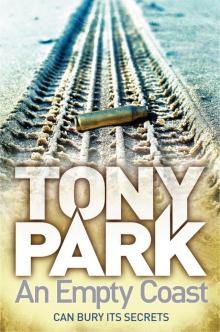 An Empty Coast
An Empty Coast Dark Heart
Dark Heart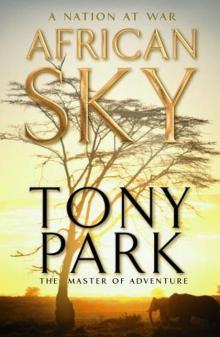 African Sky
African Sky The Delta
The Delta Captive
Captive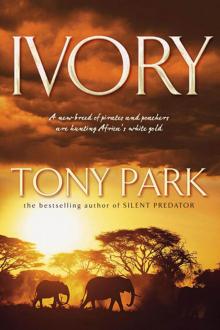 Ivory
Ivory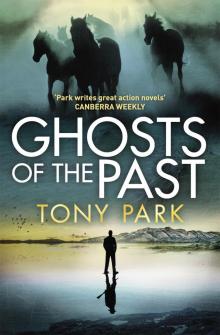 Ghosts of the Past
Ghosts of the Past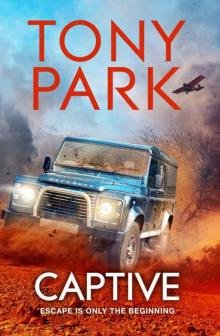 Captive_A High-octane And Gripping African Thriller
Captive_A High-octane And Gripping African Thriller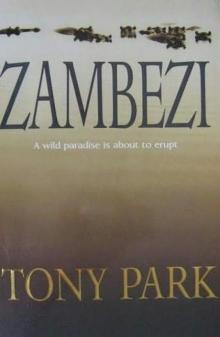 Zambezi
Zambezi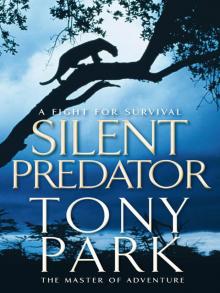 Silent Predator
Silent Predator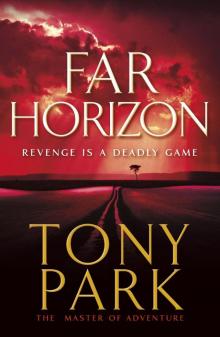 Far Horizon
Far Horizon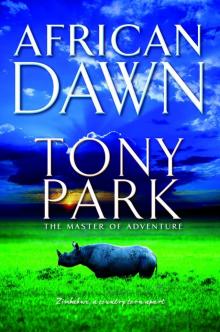 African Dawn
African Dawn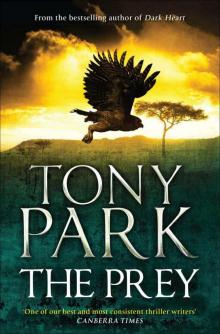 The Prey
The Prey Safari
Safari